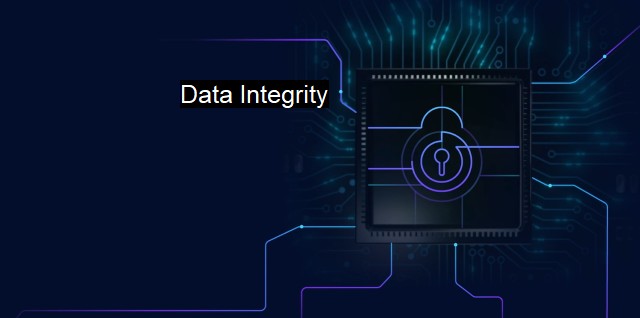What is Data Integrity?
Securing Data Integrity in Cybersecurity and Antivirus: Preventing Unauthorized Changes and Ensuring Trustworthiness
Data integrity is an important concept in cybersecurity and antivirus. It is important to understand what this term means and how it impacts both individuals and businesses.In the simplest terms, data integrity refers to the accuracy, consistency, and reliability of data stored in databases, data warehouses, data marts, or other information storage structures. it means the data is unaltered, uncorrupted, and trustworthy at all times during its entire lifecycle, including during transit and at rest.
The importance of data integrity cannot be overemphasized, especially when considering the huge volumes of data handled by different organizations in today’s data-driven world. With the increasing reliance on stored information in decision making, data must be error-free and reliable so as to provide a realistic assessment of situations and offer the ideal base for vital endeavors.
Data integrity is integral to cybersecurity as it ensures stored data remains unmodified and accessible only by authorized personnel. In an environment of constant cyberattacks, maintaining data integrity is nonnegotioable. Attackers employ sophisticated methods to corrupt, damage, delete, or alter stored data with the aim of disrupting operations or gaining illegal access to sensitive information.
Data integrity is linked to the concept of antivirus as well. Antivirus software checks and ensures that the data being accessed in any system is free from malware. Should a data file be infected with a viral program capable of altering or deleting the content, the user would receive notification from the antivirus software and the file would likely be quarantined to prevent it from infecting other files in the system.
In preserving data integrity, it is essential to have checks and measures in place. Some of the common measures include utilizing error checking and validation procedures to ensure data is accurate and reliable. Data backups, meanwhile, allow for the restoration of original data in case it's accidentally deleted or corrupted. Encryption methods can also preserve data integrity. By encoding data, only authorized users will have access to decode and recover the exact instrumental data, thereby averting unauthorized interceptions and alterations.
There are various forms of threats to data integrity, such as human errors, transfer errors, malware attacks, phishing, hacking, or exposure to destructive programs. When data integrity is compromised, it can cause enormous harm to a business, ranging from financial losses to loss of consumer trust and reputational damage.
Data integrity is particularly significant for legal and regulatory compliance. Most governments and regulatory bodies require businesses to ensure data integrity and have systems in place for data protection. Complying with these regulations goes a long way in maintaining data integrity and consequently protecting vital business and consumer information.
Data integrity is a foundational pillar of cybersecurity and antivirus practices. It goes beyond just ensuring data is accurate and reliable, it is a critical measure for maintaining secure digital environments, driving better decision making, and promoting legal compliance. Given the potential harm associated with compromised data, organizations need to invest in robust security capabilities, which can identify, protect, and respond to threats effectively to safeguard their data's integrity.
Understanding the role and relevance of data integrity in today's world marred by information threats will enable better-equipped measures of defenses. Deploying error validation methods, regular data backups, encryption, incorporation of automated validation rules, use of digital signatures and certificates, making informed decisions and fostering a data-backed business environment, will help protect data integrity and immensely boost cyber resilience. Thus, data integrity is deserving of attention and substantial actions. It should be among the top priorities for any entity concerned about the state of their data.

Data Integrity FAQs
What is data integrity in the context of cybersecurity and antivirus?
Data integrity refers to the accuracy, consistency, and reliability of data. In cybersecurity and antivirus, it means ensuring that data is not altered or tampered with, intentionally or unintentionally, during transmission, processing, or storage.What are some common threats to data integrity in cybersecurity and antivirus?
Cybercriminals, hackers, malware, viruses, ransomware, phishing, insider threats, hardware failure, software bugs, human error, and natural disasters are some common threats to data integrity in cybersecurity and antivirus.Why is data integrity important in cybersecurity and antivirus?
Data integrity is important in cybersecurity and antivirus because it ensures that the data is trustworthy and usable. It helps prevent unauthorized access, data loss, and corruption, which can lead to financial loss, legal liability, reputational damage, and other negative consequences.How can I ensure data integrity in my cybersecurity and antivirus practices?
You can ensure data integrity in your cybersecurity and antivirus practices by implementing a combination of technical, organizational, and administrative measures, such as encryption, access control, backup, monitoring, auditing, testing, training, and incident response. It is also important to follow best practices and regulations, and to stay up to date with the latest threats and solutions.| | A | | | B | | | C | | | D | | | E | | | F | | | G | | | H | | | I | | | J | | | K | | | L | | | M | |
| | N | | | O | | | P | | | Q | | | R | | | S | | | T | | | U | | | V | | | W | | | X | | | Y | | | Z | |
| | 1 | | | 2 | | | 3 | | | 4 | | | 7 | | | 8 | | |||||||